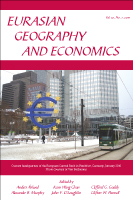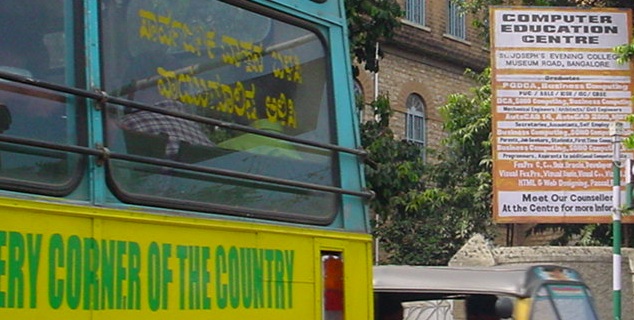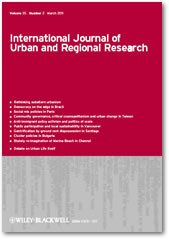Horner, Rory, Seth Schindler, Daniel Haberly, and Yuko Aoyama, 2018. “De-globalization and its limits.” Cambridge Journal of Regions, Economy and Society.
Abstract
https://doi.org/10.1093/cjres/rsx026
Horner, Rory, Seth Schindler, Daniel Haberly, and Yuko Aoyama, 2018. “De-globalization and its limits.” Cambridge Journal of Regions, Economy and Society.
https://doi.org/10.1093/cjres/rsx026
 Abstract:
Abstract:
India has emerged as a preferred location for corporate R&D and strategic marketing facilities. Until a decade ago, these functions were conducted almost exclusively near the corporate headquarters of MNEs in the developed world. One reason for the relocation of these functions to India is its changing role as a source of market information. With the saturation of the markets in the developed world, MNEs are increasingly interested in cultivating the bottom-of-the-pyramid market, which makes India an ideal location to collect market knowledge. In this paper, we focus on the emerging relationship between markets and MNEs in India. Drawing on interviews with MNEs in Bangalore, we show how the perception of India as a location of innovation has begun to change, and discuss how India has begun to serve as an ideal location for market knowledge gathering activities by MNEs. We argue that their new orientation offers a window of opportunity that has implications for other developing economies, and conclude that India’s unique combination of market assets have played an important role in enabling MNEs to upgrade their functions.
Aoyama, Yuko and Balaji Parthasarathy. “Research and Development Facilities of Multinational Enterprises in India”, Eurasian Geography and Economics, 53, 6 (2012): 713-730


“Economic Geography sponsored a workshop to brainstorm collectively the emerging research themes in economic geography. We gathered a small group of midcareer scholars from 19 institutions in 7 countries on April 12–13, 2010, in Washington, D.C., to address what we considered a collective concern: that our discipline could use a significant boost in theoretical and thematic developments at this particular juncture. The workshop was intended to be one of the journal’s many contributions to disciplinary activities and ongoing efforts to keep the discipline vibrant for the next generation. The workshop aimed to achieve multiple goals….” [Read on]
Aoyama, Yuko, 2011. “Teleology, Contexts, and Agency in Sheppard’s Socio-Spatial Ontology” Dialogues in Human Geography 1 (March): 76-79.
Aoyama, Yuko, 2009. “Consumption-centered research for diverse urban economies.” Urban Geography 30 No.4: 1-3.
Horner, Rory and Yuko Aoyama. 2009 “Limits to FDI-driven growth in Ireland: A newspaper content analysis for investment, upgrading and divestment.” Irish Geography 42 No. 2 (July): 187-207.
Aoyama, Yuko, 2009. “Entrepreneurship and Regional Culture: The case of Hamamatsuand Kyoto, Japan.” Regional Studies 43 No.3 (April): 495-512.
 Abstract
Abstract
In this article, I seek to demonstrate how research on cultural industries and tourism combined yields insights into the contemporary dynamics of cultural survival in the age of globalization. Tourism is increasingly an important economic force that facilitates cultural mobility and promotes cultural consumption, and in turn contributes to the growth of a regionally embedded cultural industry. I take the example of flamenco music and dance in southern Spain and focus on three agents that help shape this art complex — the cultural industry, the tourists and the state. I analyze how these agents interact, and show how their engagements at multiple geographic scales result in a distinctive and successful cultural tourism in Seville, Andalusia. The flamenco art complex survives and thrives today through the combination of resilient local talent closely linked to identity maintenance, domestic and foreign tourists that engage in cultural consumption, and the government subsidizing the artists through state‐sponsored spectacles.
Aoyama, Yuko. 2009. “Artists, Tourists, and the State: Cultural Tourism and the Flamenco Industry in Andalusia, Spain.” International Journal of Urban and Regional Research 33 No. 1 (March): 80-104.

Ratick, Samuel, Brian Meecham and Yuko Aoyama. 2008. “Locating Backup Facilities to Enhance Supply Chain Disaster Resilience.” Growth and Change 39, 4 (December): 642-666.
Aoyama, Yuko. 2007. “Oligopoly and the Structural Paradox of Retail TNCs: An Assessment of Carrefour and Wal-Mart in Japan.” Journal of Economic Geography, 7 (July): 471-490.
Aoyama, Yuko and Samuel Ratick. 2007. “Trust, Transactions, and Inter-firm Relations in the U.S.Logistics Industry.” Economic Geography 83 No.2 (April): 159-180.
Aoyama, Yuko. 2007. “The Role of Consumption and Globalization in a Cultural Industry: The Case of Flamenco.” Geoforum 38 No.1: 103-113.
Izushi, Hiro and Yuko Aoyama. 2006. “Industry Evolution and Cross-Sectoral Skill Transfers: A Comparative Analysis of the Video Game Industry in Japan, the United States, and the United Kingdom.” Environment and Planning A 38 No.10 (October): 1843-1861.
Aoyama, Yuko, Samuel J. Ratick and Guido Schwarz. 2006. “Organizational Dynamics of the U.S.Logistics Industry from an Economic Geography Perspective.” The Professional Geographer 58 No.3 (August): 327-340.
Parthasarathy, Balaji and Yuko Aoyama. 2006. “From Software Services to R&D Services: Local entrepreneurship in the software industry in Bangalore, India.” Environment and Planning A 38 No. 7 (July): 1269-1285.
Aoyama, Yuko, Samuel J. Ratick and Guido Schwarz. 2005. “Modeling the Impacts of Business-to-Business Electronic Commerce on the Organization of the Logistics Industry.” Geographical Analysis 37 No.1: 46-68
Aoyama, Yuko. 2005. “Retail and Distribution in the Information Age: A Research Agenda for Economic Geography.” Annals of the Japanese Economic Geographers 51 No.1: 101-115
Aoyama, Yuko and Guido Schwarz. 2004. “From Mail Order to E-Commerce: Competition, Regulation, and Politics of Non-store Retailing in Germany.” Urban Geography 25 No.6: 503-527.
Aoyama, Yuko, 2003. “Socio-Spatial Dimensions of Technology Adoption: Recent E- and M-Commerce Developments.” Environment and Planning A 35 No. 7: 1201-1221
Aoyama, Yuko and Eric Sheppard, 2003. “Introduction to the Special Issue, The Dialectics of Geographic and Virtual Spaces.” Co-guest editor for the Special issue. Environment and Planning A 35 No.7: 1151-1156
Aoyama, Yuko. 2003. “Theorizing Globalization: Prospective for Economic Geography.” Annals of the Japanese Economic Geographers 49 No.5: 467-481.
Aoyama, Yuko, 2003. “Globalization of Knowledge-Intensive Industries: The case of software production in Bangalores, India” Annual Report of Research Center for Regional Studies (ANREG) 12: 33-50.
Aoyama, Yuko and Hiro Izushi, 2003. “Hardware Gimmick or Cultural Innovation?: Technological, cultural, and social foundations of the Japanese video game industry.” Research Policy 32 No.3: 423-444.
Aoyama, Yuko and Manuel Castells, 2002. “An Empirical Assessment of the Informational Society: Employment and Occupational Structures of G-7 Countries.” International Labour Review 141 No. 1-2: 123-159.
Aoyama, Yuko, 2001. “Structural Foundations for Electronic Commerce: A Comparative Organization of Retail Trade in Japanand the United States.” Urban Geography 22 No.2: 130-153.
Aoyama, Yuko, 2000. “Keiretsu, Networks and Locations of Japanese Electronics Industry in Asia.” Environment and Planning A 32 No. 2 (February): 223-244.
Aoyama, Yuko, 1999. “Exclusion and Empowerment for Real and Virtual Communities.” Guest Editor for the special issue, Cities and the Telecommunications at Millennium’s End in Urban Geography 20 No.4, 291-293.
Aoyama, Yuko, 1999. “Policy Interventions for Industrial Network Formation: Contrasting Historical Underpinnings of the Small Business Policy in Japan and the United States.” Small Business Economics 12 No.3 (May): 217-231.
Aoyama, Yuko, 1997. “Integrating Business and Location: An Overview of Two Theoretical Frameworks on Multinational Firms.” Berkeley Planning Journal 11: 49-70.
Aoyama, Yuko, 1996. “Local Economic Development or National Industrial Strategy: Recent Trends in Small Business Policy in Japanand the United States.” Review of Urban and Regional Development Studies. 8 No.1 (January): 1-14.
Castells, Manuel and Yuko Aoyama, 1994. “Paths Towards the Informational Society: Employment Structure in G-7 Countries. 1920-1990.” International Labour Review 133, No.1: 5-33.